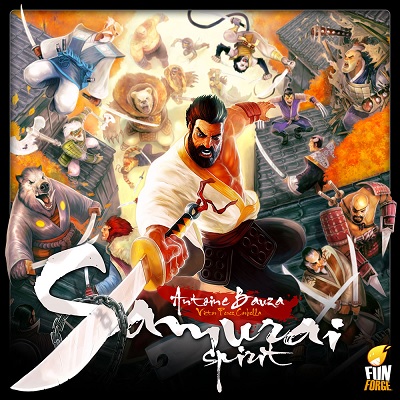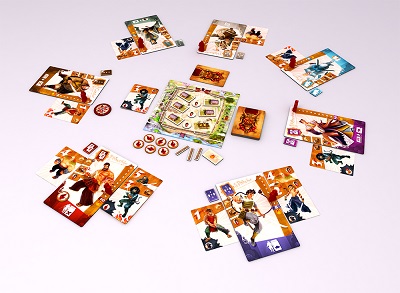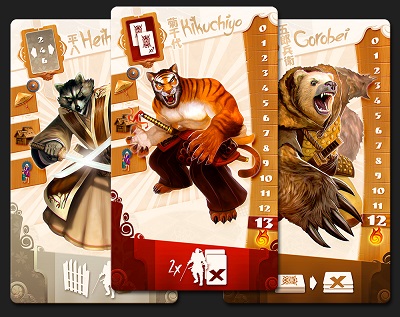

Samurai Spirit is a co-operative game for one to seven players, designed by Antoine Bauza, and published by Fun Forge. In it, players each take on the role of a noble samurai warrior, working together to defend a village from an assault by vicious raiders.
Gameplay
One of the most appealing aspects of Samurai Spirit is that it’s a fairly simple game. Not easy — oh, it is certainly not easy — but quick to set up, an simple to learn.
To begin, each player chooses a one of seven samurai that they’ll play for the duration of the game, all of whom have some unique abilities. The game board features three families, six farmsteads, and a number of barricades that varies with the number of players. There is also a deck of cards representing the raiders who’d like nothing more than to smash those barricades, raze the farmsteads, and slaughter all the people.
Most of the gameplay is in the fight mechanic. The players’ samurai each have a numbered track — “their Kiai” — representing the total strength of raiders whom they can protect against. On their turn, if they choose to fight, the player draws a raider card from the deck. Some of the cards have different icons representing different consequences depending on how the player chooses to interact with them, but all the raiders have a specific value in the upper left corner which is how strong they are. The goal is to draw as many raider cards as possible without the sum exceeding the total the player’s samurai can manage. If the combined strength of the raiders a player has chosen to fight is equal to exactly their Kiai, then the last raider card is dispatched to the “graveyard” discard pile, and the samurai’s unique power is activated. However, if the raiders’ total value exceeds the samurai’s Kiai, then the samurai is overwhelmed and a barricade is lost, or a farmstead if no barricades remain.
During the course of defending the village, the players’ samurai are likely to take wounds. On the second wound, the player flips their samurai board over and reveals their animal spirit form. This empowered version of the character can fight a greater strength of enemies, and their Kiai power is stronger when activated. If they take two more wounds, the samurai dies, and the game is lost.
The round ends when the deck of raiders is depleted, or all the players have passed. At that point, any raider cards not occupied by the samurai, or dispatched to the graveyard are able to attack the village. If there is at least one family and one farm remaining after the attack, play proceeds to the next round, with new, stronger raiders introduced to the deck. If all the samurai survive to the end of three rounds, and one family and one farmstead remain, the players triumph. If not, the samurai have failed to protect the village, and the players know only defeat and shame.
Again, it’s a simple game, built around a familiar press-your-luck mechanic, but it’s by no means easy to win. The rulebook does include rules for an easy setup — hard, and heroic setups as well — but it encourages the player to try the normal difficulty a few times before attempting the easy mode.
Components
The first thing you notice about Samurai Spirit is that it’s small. Which is to say that the amount of space the game takes up on a table is minimal.
The second thing you notice is that it’s beautiful. The game board, the cards, and the samurai boards all feature full colour illustrations by Victor Pérez Corbella.

The game board and the player boards are all very sturdy. Though the board is relatively small, it feels substantial. Several of the game pieces are tokens which need to be removed from a punchboard before you play the first time. Everything came out cleanly with no tearing, and no blade required.
One nice touch is the inclusion of samurai shaped wooden meeples, used to keep track on the Kiai battle track. Though simple tokens would have done the job just as well, it’s a nice touch.
My points of disappoint with the game’s components are the packaging and the rulebook. The box itself is fine; nice and compact, with a very dynamic illustration on the front. However, there is an insert meant to hold all the game pieces in place during storage, but it doesn’t quite fit the components. Specifically there is space which is obviously meant to hold the samurai boards – the only space which appears large enough to do so – but it’s just a bit too snug. The boards can’t lay flat inside the box, and if Samurai Spirit is a game which sees a lot of play at your table, I can imagine the edges of the samurai boards getting worn down from being taken out and put away repeatedly. Not a huge issue, but the sort of thing which never should have been shipped to stores, regardless.
More problematic is the rulebook. The print is small; not to the point where it’s difficult to read, but I can imagine it being frustrating for someone whose eyesight isn’t great. The layout of the rules can also be difficult to follow, with what should be important information not always presented alongside the rules it relates to. It would be a good idea to read the entire eleven pages before playing for the first time, as opposed to trying to learn while you play.
Theme

Noble samurai defending a village from marauding raiders is a theme I can get behind, and I think the gameplay does an excellent job translating that theme into mechanics. Generally speaking, the first round of play should present few problems. However, as the subsequent rounds ramp up in difficulty, it quickly becomes apparent that victory might not be so easy, as every poor draw makes the situation more dire.
Personally, despite the wonderful illustrations, I don’t get much out of the “fighting animal spirit” transformations. It doesn’t detract from the game in any way, but it’s also not a selling point. Obviously individual tastes will vary.
One aspect which is called out in an author’s note included on the final page of the rule book, is that the game is heavily inspired by the Akira Kurosawa film Seven Samurai, and just as the titular characters in the movie are all men, there are no women among the playable samurai. There also aren’t any warriors who transform into anthropomorphic tigers in Kurosawa’s masterpiece, but apparently that’s not a concern. Again, I don’t think it detracts from the game play, but it seems like an odd choice.
Final Thoughts
Despite any problems I have with certain aspects of the theme, the game itself is a lot of fun. The simple mechanics, challenging difficulty, and quick play time make Samurai Spirit very replayable. Though I’m personally still contending with the normal difficulty, I’m certain the Hard and Heroic set-ups will extend the game’s life even more.
If you’re a fan of co-operative games, Akira Kurosawa films, or just looking for a challenge, I’d highly recommend Samurai Spirit.
